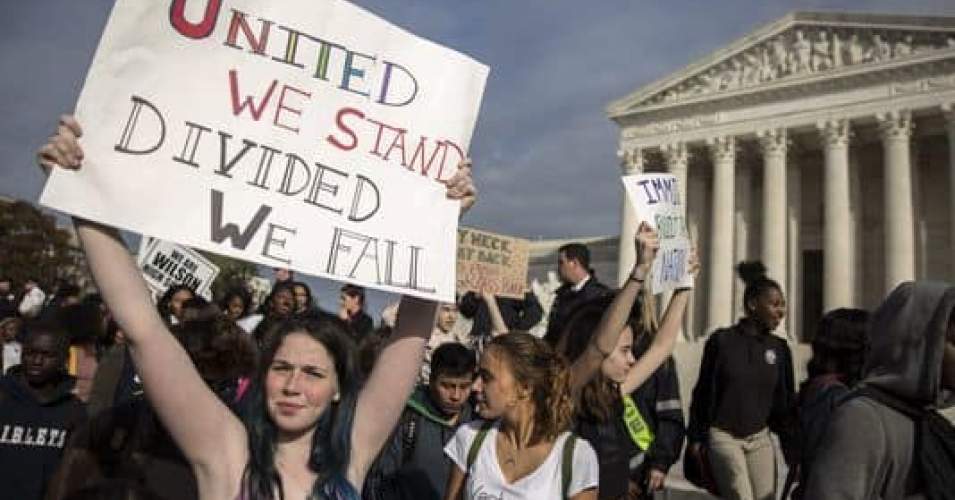
“Tribalism, then, was not an inevitable result of technological changes in the media; rather it was the product of a conscious effort to splinter the majority into groups and pit them one against the other, and deregulating the media was one of the primary tools used to accomplish this.” (Photo: Shawn Thew, European Pressphoto Agency)
The issue isn’t simply that we’ve become tribal, it’s why we have, and what we can do about it.
By S.R. Brown / 08.20.2014
Updated 09.26.2018
What is a tribe? Tribalism? Per Merriam-Webster:
Tribe: a group of people that includes many families and relatives who have the same language, customs and beliefs; a group of persons having a common character, occupation or interest.
Tribalism: loyalty to a tribe or other social group especially when combined with strong negative feelings for people outside the group.
We all belong to at least one tribe. Yes: Outside of our immediate family, even loners and introverts (and gamers) are a loose confederation of the like-minded.
Other than family ties, tribalism in the West tends to be ideological and/or social. If you think about all the people you know, they likely identify with their religious or spiritual affiliation (or lack thereof), political, occupational, or social group (s)-or any combination of the aforementioned.
I tend to be a “loose confederation”-type person, hanging with those who own dogs, are in the creative field, love good food, appreciate a Mexican Martini on a patio, read anything and everything, craft, walk/hike for fun and exercise. General geekery.
I have many friends and family who have more clearly defined ties that are on display from sun up to sun down: Vikings, Christadelphians, Libertarians. Pagans, triathletes, gays. Christians/Jews/Muslims, African-Americans, medical or financial professionals.
In other parts of the world, this is also true, though actual ethno-religious heritage and ideologies may factor in more heavily in the developing world, especially in places where resources (food, water, jobs) are scarce.
Tribes are neutral connectors, by and large. Affiliation can provide communal strength and a bond towards shared goals, interests or ideals, which can be positive under most circumstances – KKK members and Holocaust Deniers notwithstanding.
What happens, though, when a tribe feels threatened?
This threat can take the form of a perceived compromise of ideals, economic scarcity, or social marginalization. Depending on the magnitude of the problem (and power within the tribe to effectively act), you either have some fairly benign squabbles (e.g., angry blogging/tweeting/Facebook-posting), or an escalation into full-blown violent reaction (ISIS in Iraq; Ferguson, Mo.).
This closing of ranks and striking out defensively can be a catalyst for good or for evil.
ISIS (the Islamic State, as they call themselves) is slaughtering thousands (including fellow Muslims, Christians, and several splinter ethno-religious groups who refuse to bow down) to uphold their narrow view of Islam and their anti-democracy stance, thus doing serious damage to the positive aspects of Islam in the public eye (never mind the whole “genocide” aspect of their rampage). They fear that the modern world is muddying the purity of Islam, and have “established” a new Islamic Caliphate to install the “proper order of things”.
This is an example of strongly negative tribalism; i.e., killing in the name of a religious ideology for a very specific tribe’s interpretation of righteousness and skewed need for power. Their actions violate the human rights of those they oppress.
The effect of the upheaval in Ferguson over a policeman killing Michael Brown, an African-American student who was unarmed, is still TBD. Will this incident shine a light on racial inequality and lead to communal solutions? Or, will it exacerbate minority policing issue?
As I write, a CNN journalist is describing being tear-gassed by the Missouri National Guard for no apparent reason. Al Sharpton is meeting with the family. A young man is dead, and a community is outraged.
This is an example of understandable tribalism; i.e., a group defending itself in the face of marginalization and actual violence against a member. This is the perceived powerless attempting to take back their human rights. Time will tell if this actually happens, or – as stated previously – this situation begets tighter policing and more clashes.
There are many more public examples that I could outline, but I think it’s important to look at what we all do day-to-day, within our various tribes, that supports or detracts from positive human relations. Political, social and religious affiliations can easily cross over from “this is how I feel on this subject/this is what I enjoy doing” to “anyone who doesn’t support this line of thinking or being is an idiot” to “I need to exact power over you because your tribe is a threat to mine.”
Yes, this can even happen within groups whose aim is love and compassion. Frustration can occur in an increasingly dispassionate environment.
Does any of this sound familiar, if we’re honest with ourselves? As the economy still appears dicey, and the divide between rich and poor; religious and irreligious increases, the tendency to become more entrenched in specific camps to protect resources and ideologies increases as well. As I mentioned in my last column, this fear has the potential to escalate into negative effects.
As you consider your tribal relations, think about whether your actions within an affiliation are an assertion of your human rights, or a violation of another’s.
The world does not need any more of the latter.
Originally published by the Austin American Statesman under the terms of a Creative Commons license for non-commercial use.

